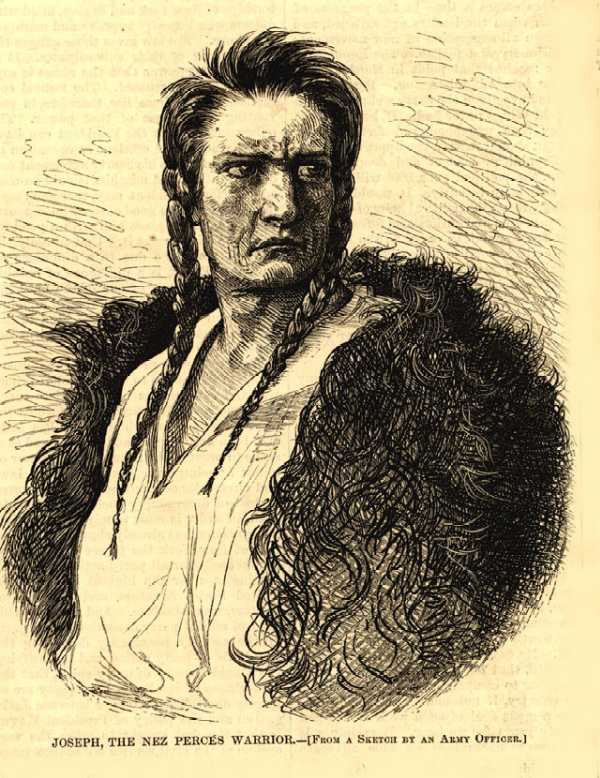

Joseph, September 1, 1877 Issue
"Our portrait of the redoubtable Indian warrior who, at the head of the
disaffected portion of the Nez PercÚs tribe, is now
waging war against the United States forces in the far West, shows him to be a man of
intelligence and strength of
character. He is certainly a shrewd and active fighter, and his influence over the Indians
is very great. The Nez PercÚs
nation numbers, all told, between four and five thousand, including women and children. Of
this number some 2500 are, by
the acts of their chiefs and head men, parties to the treaty made in 1855, by which they
agreed to relinquish their
proprietary rights to their lands, except a large reservation, which then included the
extensive mining regions in Idaho
known as Oro Fino, Elk City, Florence, the Wallowa Valley, and other camps on the Salmon
River. Subsequently, when the
miners from California, Oregon, and other mining countries began to flock into these mines
by the hundreds and thousands
in search of the precious metals, it was thought advisable to make another treaty with
these Indians, so as to curtail the
boundaries of their reservation, and leave the miners and others to pursue their mining
avocations in peace and quietness.
Accordingly an appropriation of $30,000 was made by Congress, and in May, 1863, the
Commissioners, consisting of
Captain HALE, Superintendent of Indian Affairs for Washington Territory, Messrs. HOWE and
HUTCHINS, were sent to the
Lapwai, some twelve miles above the town of Lewiston, to make said treaty.
A portion of the tribe, however, under Chief JOSEPH, father of the present chief, would
have nothing to do with this
bargain, and are known as the non-treaty Indians. But they have always remained peaceful
and quiet, and were incited to
hostilities only in defense of their lands against the encroachments of the whites. JOSEPH
and his band were in quiet
possession of the Wallowa Valley, which runs down to the Snake River, below the Salmon and
nearly opposite to Grand
Round, in Oregon. The Snakes occupied it by superior force till driven out by General
CROOK ; then the JOSEPH band
took possession of it, it being part of the lands claimed and formerly and for fifty years
owned by the Nez PercÚs. It is said
that these Indians had assurances from the War Department that they should not be
molested, and great was their
indignation when General HOWARD ordered them to leave within thirty days to go on the
Lapwai reservation and join the
treaty faction, which they ostensibly did. They left, but, in fact, left to inform all the
non-treaty tribes, with their allies, to
make war to the bitter end to regain what of rights they believe to be their own. And it
must be allowed that they have a
great deal of right on their side.
A correspondent of the New York Herald predicts a long and bloody war with the Nez PercÚs
Indians and their allies. He
believes that 5000 men will be required to subdue them. They can bring into the field 1200
warriors, brave and well armed,
and capable of holding their own against a vastly superior force of troops. Their mode of
fighting, their knowledge of the
country, the ease and celerity with which they shift their quarters and attack or retreat,
give them a great advantage over
the soldiers. (pp. 680, C1)"
text from Harper’s Weekly. November 17, 1877.